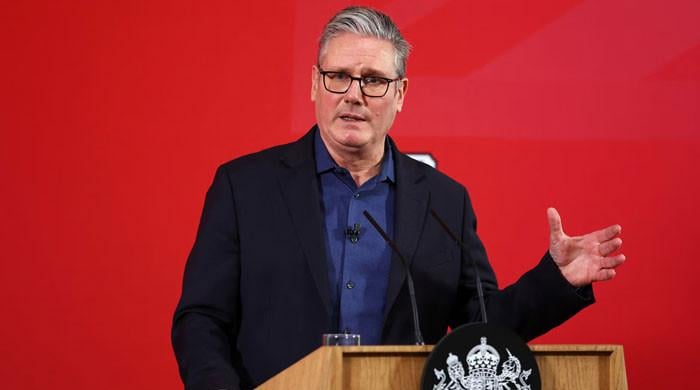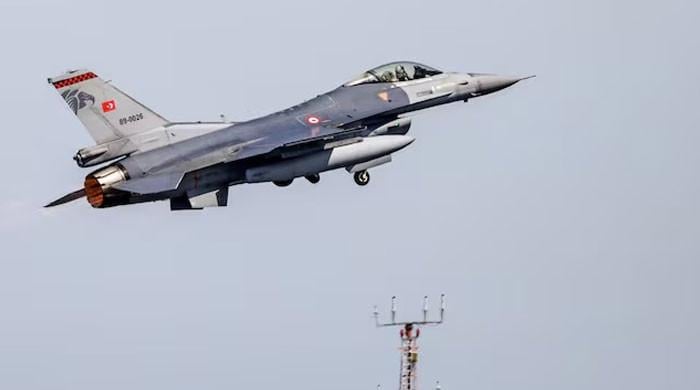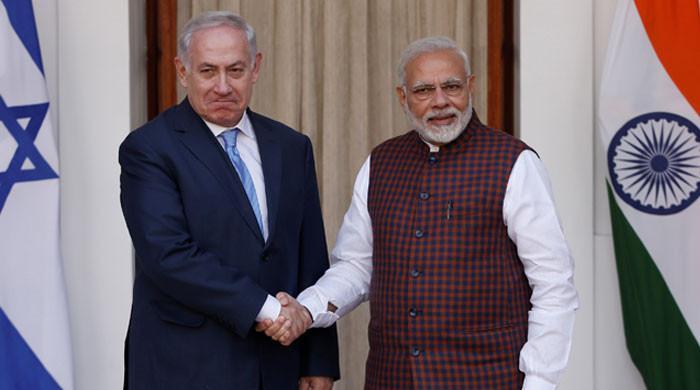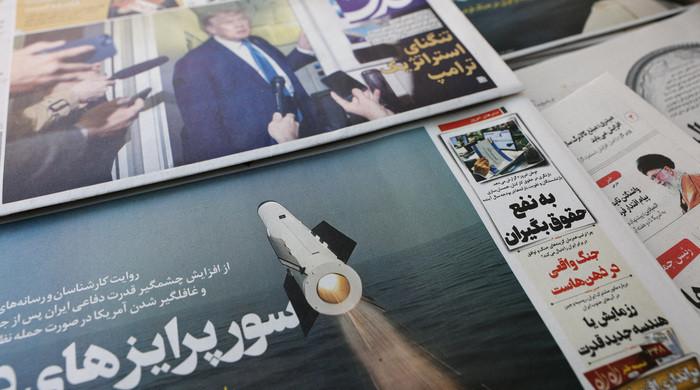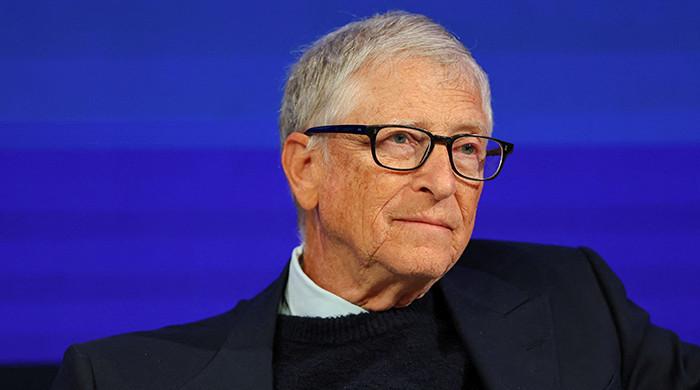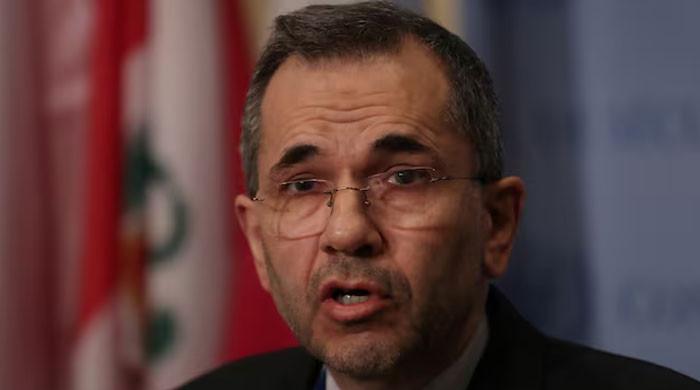Turkey, Syria earthquake death toll goes past 33,000
"We have so far failed the people in north-west Syria," says UN aid chief
February 12, 2023
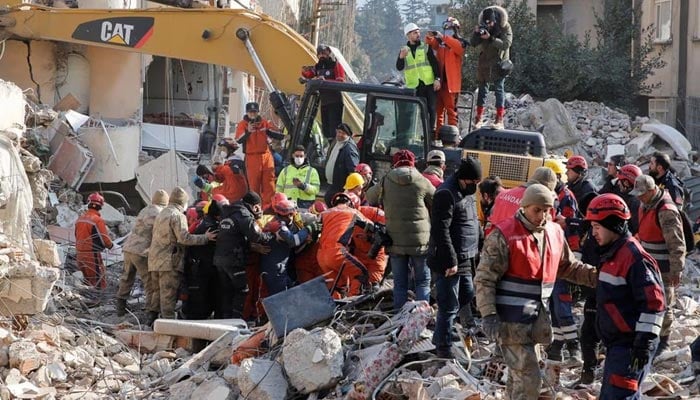
- Death toll 29,695 in Turkey, more than 3,500 in Syria.
- Hundreds of thousands homeless in middle of winter.
- UN aid chief says world has failed people of northwest Syria.
ANTAKYA: Rescuers pulled more survivors from the rubble on Sunday six days after one of the worst earthquakes hit Turkey and Syria, as Turkish authorities sought to maintain order across the disaster zone and began legal action over some building collapses.
With chances of finding more survivors growing more remote, the toll in both countries from Monday's earthquake and major aftershocks rose above 33,000 and looked set to keep growing. It was the deadliest quake in Turkey since 1939.
Displaced residents in the Turkish city of Kahramanmaras, near the epicentre, said they had set up tents as close as they could to their damaged or destroyed homes in an effort to prevent them from being looted.
Facing questions over his response to the earthquake as he prepares for a national election that is expected to be the toughest of his two decades in power, President Tayyip Erdogan promised to start rebuilding within weeks.
In Syria, the disaster hit hardest in the rebel-held northwest, leaving homeless yet again many people who had already been displaced several times by a decade-old civil war. The region has received little aid compared to government-held areas.
"We have so far failed the people in north-west Syria," United Nations aid chief Martin Griffiths tweeted from the Turkey-Syria border, where only a single border crossing is open for UN aid supplies.
"They rightly feel abandoned," Griffiths said, adding that he was focused on addressing that swiftly.
More than six days after the first quake struck, emergency workers still found a handful of people clinging to life in the wreckage of homes which had become tombs for many thousands.
In the city of Antakya in southern Turkey, a team of Chinese rescuers and Turkish firefighters saved 54-year-old Syrian Malik Milandi after he survived 156 hours in the rubble.
Such scenes have become rare as the number of dead climbs relentlessly.
At a funeral near Reyhanli, veiled women wailed and beat their chests as bodies were unloaded from lorries - some in closed wood coffins, others in uncovered coffins, and still others just wrapped in blankets.
One resident of Kahramanmaras said he had not yet buried his relatives because there were not enough funeral shrouds left to wrap them in. On a road into the town, a big truck was stacked to the brim with wooden coffins.
Security fears and detention orders
Along the main road into Antakya, where the few buildings left standing had large cracks or caved-in facades, traffic occasionally halted as rescue teams called for silence to detect signs of remaining life under the ruins.
Building quality in a country which lies on several seismic fault lines has come into sharp focus in the aftermath of the quake.
Vice President Fuat Oktay said 131 suspects had so far been identified as responsible for the collapse of some of the thousands of buildings flattened in the 10 affected provinces.
"We will follow this up meticulously until the necessary judicial process is concluded, especially for buildings that suffered heavy damage and buildings that caused deaths and injuries," he said.
The earthquake hit as Erdogan faces presidential and parliamentary elections scheduled for June. Even before the disaster, his popularity had been falling due to soaring inflation and a slumping Turkish currency.
Some affected by the quake and opposition politicians have accused the government of slow and inadequate relief efforts early on, and critics have questioned why the army, which played a key role after a 1999 earthquake, was not brought in sooner.
Erdogan has acknowledged problems, such as the challenge of delivering aid despite damaged transport links, but said the situation had been brought under control. He has called for solidarity and condemned "negative" politicking.
He has also warned that looters will be severely punished. Among the aid vans heading towards Kahramanmaras, police led a convoy of eight army vehicles.
Gizem, a rescue worker from the southeastern province of Sanliurfa, said she had seen looters in the city of Antakya. "We cannot intervene much, as most of the looters carry knives."
One elderly resident of Kahramanmaras said that gold jewellery in his home had been stolen, while in the port city of Iskenderun police were deployed at junctions of commercial streets with many phone and jewellery shops.
Two German rescue organisations suspended work in Turkey on Saturday, citing reports of clashes between groups of people and highlighting concerns for security in the quake-hit areas.
Syria aid 'held up'
In Syria, the hostilities that have fractured the country during 12 years of civil war are now hindering relief work.
Earthquake aid from government-held regions into territory controlled by hardline opposition groups has been held up by approval issues with the Hayat Tahrir al-Sham (HTS) which controls much of the region, a UN spokesperson said.
An HTS source in Idlib told Reuters the group would not allow any shipments from government-held areas and that aid would be coming in from Turkey to the north.
"Turkey has opened all the roads and we won't allow the regime to take advantage of the situation to show they are helping," the source said.
The UN is hoping to ramp up cross-border operations by opening an additional two border points between Turkey and opposition-held Syria for aid deliveries, spokesperson Jens Laerke said.
The foreign minister of the United Arab Emirates met Syrian President Bashar al-Assad on Sunday in the first high-level visit by an Arab official since the quake.
Several Arab countries have provided support to Assad in the quake's aftermath. Western countries, which sought to isolate Assad after his crackdown on protests in 2011 and the outbreak of civil war, are major contributors to UN relief efforts across Syria but have provided little direct aid to Damascus.
The first shipment of European earthquake aid to government-held parts of Syria also arrived in Damascus on Sunday.
UN relief chief Griffiths will travel to the northern Syrian city of Aleppo on Monday to survey the damage and launch a United Nations appeal for Syria, which he hopes will cover both government and non-government zones of control.
The quake ranks as the world's sixth deadliest natural disaster this century, its death toll exceeding the 31,000 from a quake in neighbouring Iran in 2003.
It has killed 29,605 people in Turkey and more than 3,500 in Syria, where tolls have not been updated for two days.
Turkey said about 80,000 people were in hospital, and more than 1 million in temporary shelters.




